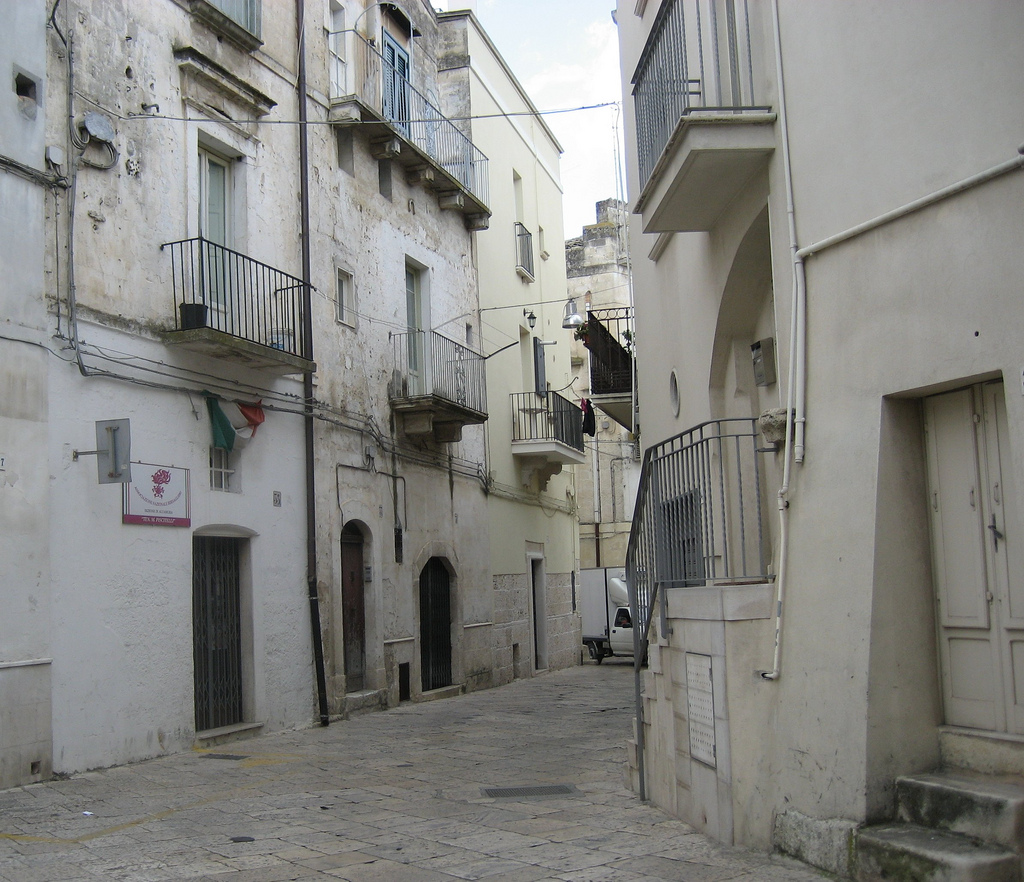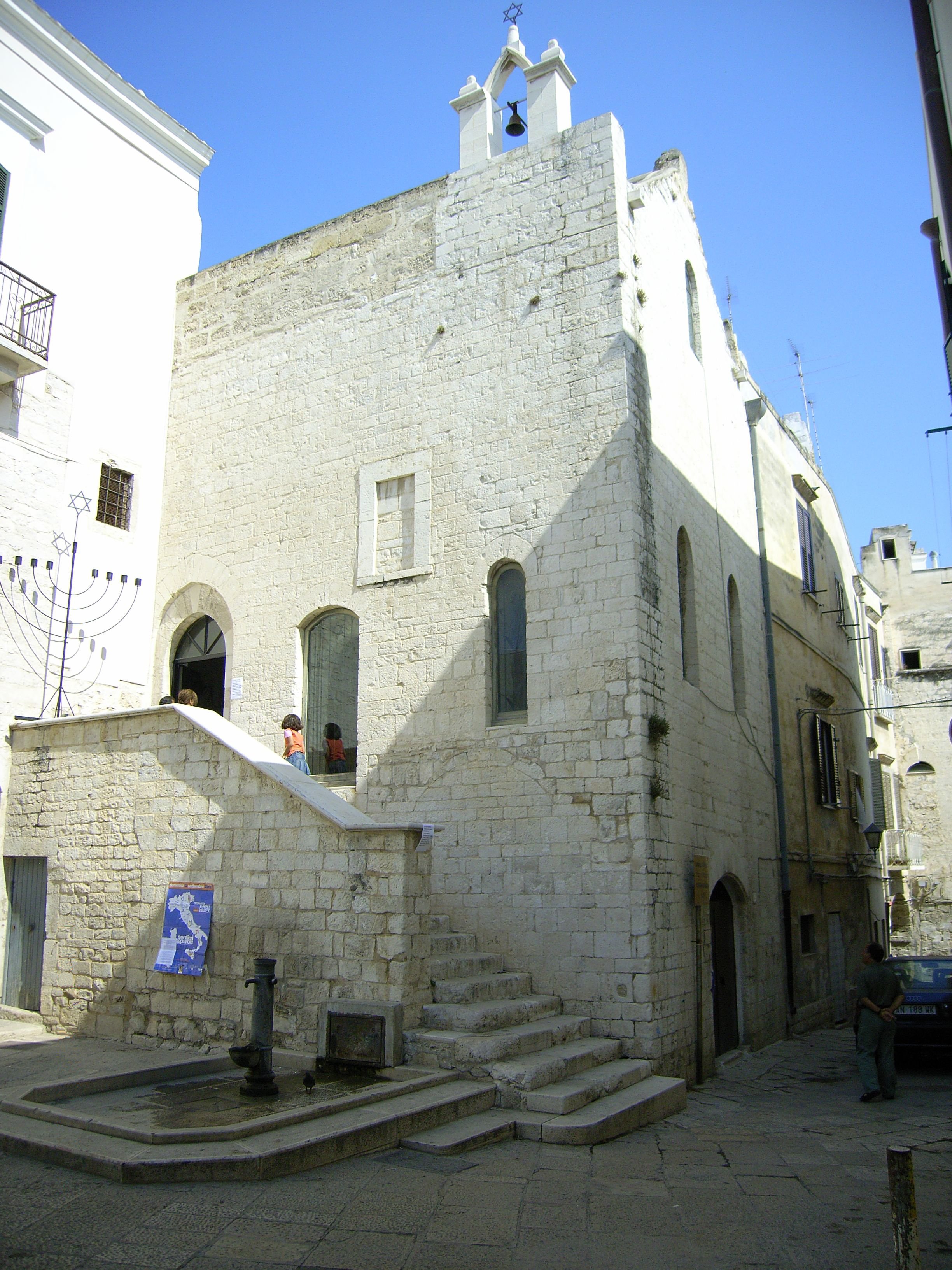|
Domenico Tranaso
Domenico Tranaso (1796 - 1854) was a notary from Altamura who was sentenced to eight years of imprisonment in Trani prison in 1850 after attempting to overthrow the government of Altamura in 1848. Life Domenico was born in about 1796 in Vieste to Biaggio Tranaso and Gaetana Olivieri. Biaggio's status as a property owner in Vieste likely allowed him to secure a notary position for his son in nearby Altamura by the year 1823. Later in 1823, Domenico married Clemenzia Deluzio, with whom he had eight children. Participation in 1848 Altamura riots Tensions in Altamura were high throughout the year 1848, particularly in November with the attempted ouster of Judge Don Costantino Fiorese from Gravina that subsequently led to the National Guard being summoned to the city. On the night of November 5, the Guardhouse that contained the 80 guards that arrived to patrol the city was invaded and looted by a mob of peasants. The soldiers disbanded and the mob removed all the furniture and burn ... [...More Info...] [...Related Items...] OR: [Wikipedia] [Google] [Baidu] |
Altamura
Altamura (, ; nap, label= Barese, Ialtamùre) is a town and ''comune'' of Apulia, in southern Italy. It is located on one of the hills of the Murge plateau in the Metropolitan City of Bari, southwest of Bari, close to the border with Basilicata. , its population amounts to 70,595 inhabitants. The city is known for its particular quality of bread called Pane di Altamura, which is sold in numerous other Italian cities. The 130,000-year-old calcified Altamura Man was discovered in 1993 in the nearby limestone cave called ''grotta di Lamalunga''. History The area of modern Altamura was densely inhabited in the Bronze Age (La Croce settlement and necropolis). The region contains some fifty tumuli. Between the 6th and the 3rd century BC a massive line of megalithic walls was erected, traces of which are still visible in some areas of the city. Ancient city The city was inhabited until around the tenth century AD. Then it was reportedly looted by Saracens. There are no reliable ... [...More Info...] [...Related Items...] OR: [Wikipedia] [Google] [Baidu] |
Trani
Trani () is a seaport of Apulia, in southern Italy, on the Adriatic Sea, by railway west-northwest of Bari. It is one of the capital cities of the Province of Barletta-Andria-Trani. History Overview The city of ''Turenum'' appears for the first time in the Tabula Peutingeriana, a 13th-century copy of an ancient Roman itinerary. The name, also spelled ''Tirenum'', was that of the Greek hero Diomedes. The city was later occupied by the Lombards and the Byzantines. First certain news of an urban settlement in Trani, however, trace back only to the 9th century. The most flourishing age of Trani was the 11th century, when it became an episcopal see in place of Canosa, destroyed by the Saracens. Its port, well placed for the Crusades, then developed greatly, becoming the most important on the Adriatic Sea. In the year 1063 Trani issued the '' Ordinamenta et consuetudo maris'', which is "the oldest surviving maritime law code of the Latin West".Paul Oldfield, ''City and Community ... [...More Info...] [...Related Items...] OR: [Wikipedia] [Google] [Baidu] |
Vieste
Vieste (; nap, label= Viestano, Vìst) is a town, ''comune'' and former Catholic bishopric in the province of Foggia, in the Apulia region of southeast Italy. A marine resort in Gargano, Vieste has received Blue Flags for the purity of its waters from the Foundation for Environmental Education. The area covered by the comune is included in the Gargano National Park. History In medieval times, the port was frequently attacked by pirates, Saracens and other enemies of the Kingdom of Naples. In 1554 approximately 7,000 inhabitants were enslaved by the Turks. Those deemed too elderly or infirm for slavery were executed. This event is commemorated in an annual ceremony. Geography The town is bordered by Mattinata, Monte Sant'Angelo, Peschici and Vico del Gargano. The coast has interesting geology; cliffs composed of chalk-like white limestone, sparsely banded with thin layers of flint. Next to the town there are two large, straight beaches. The remainder of the coast is co ... [...More Info...] [...Related Items...] OR: [Wikipedia] [Google] [Baidu] |
Carbonari
The Carbonari () was an informal network of secret revolutionary societies active in Italy from about 1800 to 1831. The Italian Carbonari may have further influenced other revolutionary groups in France, Portugal, Spain, Brazil, Uruguay and Russia. Although their goals often had a patriotic and liberal basis, they lacked a clear immediate political agenda. They were a focus for those unhappy with the repressive political situation in Italy following 1815, especially in the south of the Italian Peninsula. Members of the Carbonari, and those influenced by them, took part in important events in the process of Italian unification (called the ''Risorgimento''), especially the failed Revolution of 1820, and in the further development of Italian nationalism. The chief purpose was to defeat tyranny and to establish a constitutional government. In the north of Italy other groups, such as the Adelfia and the Filadelfia, were associate organizations. Organization The Carbonari were a s ... [...More Info...] [...Related Items...] OR: [Wikipedia] [Google] [Baidu] |
1796 Births
Events January–March * January 16 – The first Dutch (and general) elections are held for the National Assembly of the Batavian Republic. (The next Dutch general elections are held in 1888.) * February 1 – The capital of Upper Canada is moved from Newark to York. * February 9 – The Qianlong Emperor of China abdicates at age 84 to make way for his son, the Jiaqing Emperor. * February 15 – French Revolutionary Wars: The Invasion of Ceylon (1795) ends when Johan van Angelbeek, the Batavian governor of Ceylon, surrenders Colombo peacefully to British forces. * February 16 – The Kingdom of Great Britain is granted control of Ceylon by the Dutch. * February 29 – Ratifications of the Jay Treaty between Great Britain and the United States are officially exchanged, bringing it into effect.''Harper's Encyclopaedia of United States History from 458 A. D. to 1909'', ed. by Benson John Lossing and, Woodrow Wilson (Harper & Brothers, 191 ... [...More Info...] [...Related Items...] OR: [Wikipedia] [Google] [Baidu] |
1854 Deaths
Events January–March * January 4 – The McDonald Islands are discovered by Captain William McDonald aboard the ''Samarang''. * January 6 – The fictional detective Sherlock Holmes is perhaps born. * January 9 – The Teutonia Männerchor in Pittsburgh, U.S.A. is founded to promote German culture. * January 20 – The North Carolina General Assembly in the United States charters the Atlantic and North Carolina Railroad, to run from Goldsboro through New Bern, to the newly created seaport of Morehead City, near Beaufort. * January 21 – The iron clipper runs aground off the east coast of Ireland, on her maiden voyage out of Liverpool, bound for Australia, with the loss of at least 300 out of 650 on board. * February 11 – Major streets are lit by coal gas for the first time by the San Francisco Gas Company; 86 such lamps are turned on this evening in San Francisco, California. * February 13 – Mexican troops force William Walker ... [...More Info...] [...Related Items...] OR: [Wikipedia] [Google] [Baidu] |
Italian Notaries
Italian(s) may refer to: * Anything of, from, or related to the people of Italy over the centuries ** Italians, an ethnic group or simply a citizen of the Italian Republic or Italian Kingdom ** Italian language, a Romance language *** Regional Italian, regional variants of the Italian language ** Languages of Italy, languages and dialects spoken in Italy ** Italian culture, cultural features of Italy ** Italian cuisine, traditional foods ** Folklore of Italy, the folklore and urban legends of Italy ** Mythology of Italy, traditional religion and beliefs Other uses * Italian dressing, a vinaigrette-type salad dressing or marinade * Italian or Italian-A, alternative names for the Ping-Pong virus, an extinct computer virus See also * * * Italia (other) * Italic (other) * Italo (other) * The Italian (other) * Italian people (other) Italian people may refer to: * in terms of ethnicity: all ethnic Italians, in and outside of Italy * in ... [...More Info...] [...Related Items...] OR: [Wikipedia] [Google] [Baidu] |
People From Altamura
A person ( : people) is a being that has certain capacities or attributes such as reason, morality, consciousness or self-consciousness, and being a part of a culturally established form of social relations such as kinship, ownership of property, or legal responsibility. The defining features of personhood and, consequently, what makes a person count as a person, differ widely among cultures and contexts. In addition to the question of personhood, of what makes a being count as a person to begin with, there are further questions about personal identity and self: both about what makes any particular person that particular person instead of another, and about what makes a person at one time the same person as they were or will be at another time despite any intervening changes. The plural form "people" is often used to refer to an entire nation or ethnic group (as in "a people"), and this was the original meaning of the word; it subsequently acquired its use as a plural form of per ... [...More Info...] [...Related Items...] OR: [Wikipedia] [Google] [Baidu] |



_1938.jpg)